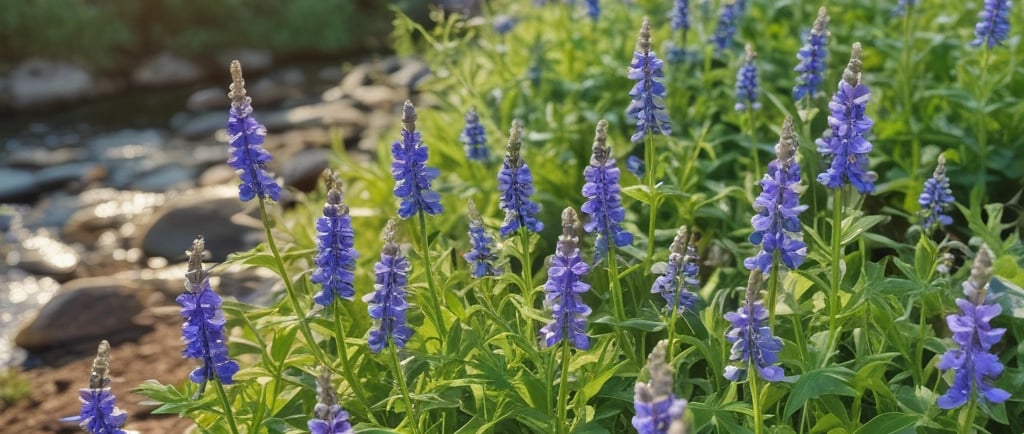Herbal Backer News & Updates: FLASH SALE!!! LIMITED TIME ONLY
Discover the benefits of Skullcap: Nature's Calming Herb for Mind and Body
Dive into the world of skullcap (Scutellaria lateriflora), a versatile herb cherished in traditional medicine for its soothing effects on the mind and body. Learn about its top benefits, how it supports your nervous system, simple ways to use it for better sleep, safe consumption tips, delicious recipes, and fun facts that make this herb a must-have in your natural wellness toolkit.
NERVINEANXIETYRECIPESCENTRAL NERVOUS SYSTEMSTRESSSLEEP AIDE
10/25/20254 min read


Introduction: Welcome to the World of Skullcap!
Hey there, fellow wellness enthusiasts! Have you ever felt like life's stresses are piling up, leaving you tossing and turning at night? Enter skullcap, a humble yet powerful herb that's been a staple in Native American and traditional Chinese medicine for centuries. With its dainty blue flowers shaped like tiny helmets (hence the name!), this member of the mint family isn't just pretty—it's packed with compounds that can help you unwind and recharge. Whether you're new to herbal remedies or a seasoned pro, this post will guide you through why skullcap deserves a spot in your home apothecary. Let's explore its benefits, science-backed effects, and even some tasty recipes to make incorporating it fun and easy!
Top 10 Properties of Skullcap: A Bulleted Breakdown
Skullcap boasts an impressive array of properties, thanks to its rich flavonoids like baicalin and scutellarein. Here's a curated list of its top 10, each with a brief description based on traditional uses and emerging research:
Anxiety Relief: Skullcap acts as a natural calming agent, helping to reduce feelings of worry and tension by enhancing GABA activity in the brain, similar to some anti-anxiety meds.
Sleep Support: It promotes relaxation and combats insomnia, making it easier to fall asleep and stay asleep without the grogginess of over-the-counter aids.
Anti-Inflammatory Effects: The herb's antioxidants help soothe inflammation, potentially easing conditions like arthritis or inflammatory bowel issues.
Anticancer Potential: Compounds in skullcap, such as baicalein, show promise in inhibiting cancer cell growth in lab studies, though more human research is needed.
Antioxidant Power: It fights free radicals, protecting cells from oxidative stress that contributes to aging and chronic diseases.
Anticonvulsant Properties: Traditionally used to reduce seizures and spasms, it may help manage epilepsy symptoms in some cases.
Neuroprotective Benefits: Skullcap safeguards brain cells, potentially lowering the risk of neurodegenerative diseases like Alzheimer's and Parkinson's.
Heart Health Support: It may reduce the risk of heart disease by protecting against damage from oxidative stress and improving antioxidant defenses.
Antibacterial and Antiviral Actions: Effective against certain bacteria and viruses, it could help prevent infections like those from drug-resistant strains.
Fever Reduction: Used in traditional remedies to lower fevers associated with colds, flu, or allergies by cooling the body naturally.
How Skullcap Affects the Central Nervous System
Skullcap has a profound impact on the central nervous system (CNS), primarily through its ability to stimulate gamma-aminobutyric acid (GABA), a key neurotransmitter that promotes calm and reduces nerve excitability. This direct effect helps dial down anxiety and stress responses, acting like a natural sedative without heavy drowsiness. Indirectly, its antioxidant and anti-inflammatory properties protect neurons from damage, supporting overall brain health and potentially warding off conditions like depression or neurodegenerative diseases. Think of it as a gentle hug for your overworked nervous system—helping restore balance in a hectic world!
Using Skullcap as a Sleep Aid
Absolutely, skullcap shines as a sleep aid! By enhancing GABA and inducing relaxation, it can help quiet a racing mind and ease into restful slumber. Many people find it effective for occasional insomnia or restlessness, especially when combined with other calming herbs like valerian or lemon balm. Take it about an hour before bed for best results—start low and see how your body responds.
How to Take Skullcap: Dosage and Precautions
Skullcap is versatile and available as teas, tinctures, capsules, or dried herb. A common dosage for adults is 1-2 grams of dried leaves daily, or 1-2 ml of tincture up to three times a day. For sleep, try 1,050 mg in the evening. Always start with a small amount to gauge tolerance.
Precautions: While generally safe, skullcap has been linked to rare liver issues, so avoid it if you have liver problems or are taking medications that affect the liver. It's not recommended for pregnant or breastfeeding individuals, children, or those on sedatives, as it may enhance their effects. Consult a healthcare provider before starting, especially if you have diabetes (it may lower blood sugar) or are on other meds. Source from reputable suppliers to avoid contaminants.
Recipe Section: 3 Easy Ways to Enjoy Skullcap
Get hands-on with these simple recipes! They're beginner-friendly and a fun way to incorporate skullcap into your routine.
Calming Skullcap Tea Ingredients: 1 tablespoon dried skullcap leaves, 2 cups boiling water, honey to taste. Instructions: Steep the leaves in boiling water for 10 minutes in a teapot. Strain, sweeten with honey, and sip in the evening for relaxation. Pro tip: Add lemon balm for extra zen!
Homemade Skullcap Tincture Ingredients: ½ cup dried skullcap leaves, 1 cup 100-proof vodka (or apple cider vinegar for non-alcoholic). Instructions: Fill a jar halfway with leaves, cover with vodka, seal, and shake daily for the first week, then weekly for 5 more weeks. Strain and store in a dropper bottle. Take 1 teaspoon diluted in water before bed. This potent extract lasts for months!
Skullcap Sleep Blend Infusion Ingredients: 1 teaspoon dried skullcap, 1 teaspoon valerian root, 1 teaspoon passionflower, 1 cup boiling water. Instructions: Mix the herbs, steep in boiling water for 15 minutes, strain, and drink 30-60 minutes before sleep. Sweeten if desired. This combo amplifies skullcap's sedative effects for deeper rest.
Fun Facts and Why Skullcap Belongs in Your Home Remedy Arsenal
Did you know skullcap was once smoked by Native Americans to induce visions or clear the throat? Or that its Latin name "Scutellaria" means "little dish," referring to the flower's cap-like shape? Fun aside, this herb's importance lies in its gentle, natural approach to modern woes like stress and poor sleep—without the side effects of synthetic drugs. Imagine having a "chill pill" straight from nature! Plus, growing it in your garden is easy; it thrives in moist, shady spots and attracts pollinators. Adding skullcap to your arsenal means empowering yourself with a time-tested remedy for everyday wellness—think of it as your secret weapon against burnout.
Conclusion: Embrace the Calm with Skullcap
There you have it—a complete guide to skullcap, the unsung hero of herbal medicine! From its anxiety-busting powers to those cozy bedtime recipes, this herb offers a natural path to better mental and physical health. Remember, while it's backed by tradition and some science, it's not a cure-all—always pair it with a balanced lifestyle and professional advice. Why not brew a cup tonight and feel the magic for yourself? Here's to calmer days and sweeter dreams. What's your favorite herbal remedy? Share in the comments below! Stay well, friends
